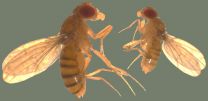(Press-News.org) Researchers at the University of Liverpool have found that screening for Ebola at airports could be an effective method for preventing the spread of the disease into the UK and US, but due to the long incubation period of the virus, screening won't detect all cases.
Published in the Lancet medical journal, the study used a mathematical model to test the probability of infected travellers from West Africa entering the UK and US.
The team, from the University's Institute of Infection and Global Health, examined the current growth rate of the epidemic in West Africa alongside airline travel patterns to predict how many people with Ebola are likely to attempt to fly.
The research showed that approximately 29 Ebola infected people are expected to try and leave West Africa by the end of the year and 10 would be likely to display signs of the infection that could be picked up by airport screening.
Of the remaining 19 passengers only one or two would be expected to fly to the UK and up to three to the US. It is thought that one of these passengers would have developed virus symptoms by the time they arrive in the UK or USA.
Epidemiologist, Dr Jonathan Read, said: "We developed a mathematical model to consider how long people incubate the virus alongside how likely airline passengers are to be infected. "From this we were able to estimate that 10 of the 29 people likely to leave West Africa via airports this year would have symptoms of the disease and so could be detected at exit screening."
The model showed that one or two passengers may not be detected at screening, but that a single case in the UK or US would not lead to the situation in West Africa, due to better control measures in these countries.
Researchers highlighted, however, that the most effective way to restrict Ebola's global spread is to control the disease at the source in West Africa.
Professor Tom Solomon, head of the Institute of Infection and Global Health, added: "This research shows that entry screening can reduce the overall chances of Ebola being brought into the UK, but that some infected passengers may still get through undetected.
"Even if we do see a case of Ebola that has not been detected at airport screening we have a good chance of stopping the spread of the infection."
INFORMATION:
To read the research paper, please visit: http://www.thelancet.com/journals/lancet/article/PIIS0140-6736(14)61894-8/fulltext
People with bipolar disorder who are being treated with the drug lithium are at risk of acute kidney damage and need careful monitoring, according to new research from the University of East Anglia (UEA) and Norfolk and Suffolk NHS Foundation Trust.
Lithium is a mainstay treatment for bipolar disorder and it is known that the drug can cause a loss of kidney function. The new research establishes the link between short-term exposure to high levels and potential damage to the kidneys.
It is still not known what the impact of more than a single exposure to high levels ...
Scientists from the University of Liverpool have sequenced the mitochondrial genome in glaucoma patients to help further understanding into the genetic basis for the disease.
Glaucoma is a major cause of irreversible blindness, affecting more than 60 million people worldwide, increasing to an estimated 79.6 million people by 2020. It is thought that the condition has genetic origins and many experiments have shown that new sequencing approaches could help understand how the condition develops.
Studies on primary open-angle glaucoma - the most common form of glaucoma ...
Age-related Macular Degeneration (AMD) is the major cause of blindness in the western world, affecting around 50 million people. It has been shown that sufferers are genetically predisposed to develop the condition.
One of the most important risk associated genes is called complement factor H (CFH). This encodes a protein called factor H (FH) that is responsible for protecting our eyes from attack by part of our immune system, called the complement system. FH achieves this by sticking to tissues, and when it is present in sufficient quantities it prevents the complement ...
Animal growth is closely regulated by environmental factors such as nutrition. If the nutrition of a growing animal is limited, growth slows down and the eventual size of the animal remains smaller. Insulin-like signaling plays a key role in coordinating growth in response to dietary status in multicellular animals.
Doctoral student Kiran Hasygar and Assistant Professor Ville Hietakangas from the Department of Biosciences and Institute of Biotechnology, University of Helsinki, Finland, have now uncovered a new regulatory mechanism coordinating animal growth in response ...
Prostate cancer patients carrying inherited mutations in the BRCA genes respond less well to conventional treatment, including surgery and/or radiotherapy - and they also have a lower survival rate than those who are non-carriers of these genetic mutations. Data from the study, which has been published in the journal European Urology, points to the need for new clinical trials aimed at targeting these mutations in order to tailor treatment for these patients.
The study has been led by David Olmos and Elena Castro at the Spanish National Cancer Research Centre (CNIO) ...
The expression of SIP1 protein in pharyngeal squamous cell carcinoma tumours often indicates an advanced tumour stage, a high risk of recurrence and a poor prognosis, according to research from the University of Eastern Finland. Based on the results, SIP1 is a potential new prognostic factor for clinical use, helping to single out patients with more aggressive tumour behaviour requiring more intensive therapy and closer follow-up. Ms Anna Jouppila-Mättö, MD, presented the results in her doctoral thesis.
Although pharyngeal squamous cell carcinoma (PSCC) is a ...
PROVIDENCE, R.I. [Brown University] -- A new study documents the stark health dangers of the male sex trade in the streets, hotels, and discotheques of Mexico City. Lead author and health economist Omar Galárraga's point in making the grim assessment of the legal but perilous market is to find an incentive that might reduce the spread of HIV and other diseases in the nation's community of men who have sex with men.
"It's a very highly at-risk population," said Galárraga, assistant professor of health services, policy and practice in the Brown University School ...
Since the 1850's scientists have known that crystalline materials are organized into fourteen different basic lattice structures. However, a team of researchers from Vanderbilt University and Oak Ridge National Laboratory (ORNL) now reports that it has discovered an entirely new form of crystalline order that simultaneously exhibits both crystal and polycrystalline properties, which they describe as "interlaced crystals."
Writing in the Nov. 14 issue of the journal Nature Communications, the researchers describe finding this unusual arrangement of atoms while studying ...
A team of Cardiff University researchers have made a breakthrough in helping scientists discover hundreds of black holes throughout the universe.
When two detectors are switched on in the US next year, the Cardiff team hope their research will help scientists pick up the faint ripples of black hole collisions millions of years ago, known as gravitational waves.
Black holes cannot be seen, but scientists hope the revamped detectors - which act like giant microphones - will find remnants of black hole collisions.
Led by Dr Mark Hannam from the School of Physics and Astronomy, ...
(PHILADELPHIA) - Although radiation treatments have become much more refined in recent years, it remains a challenge to both sufficiently dose the tumor while sparing the surrounding tissue. A new anti-cancer drug, already in clinical development, may help address this issue by protecting normal cells - but not the cancer - from the effects of radiation. The research, published November 14th in Molecular Cancer Therapeutics, further suggests this drug may also be useful in treating accidental exposure to radiation.
"It was a stroke of luck that the drug that most effectively ...



